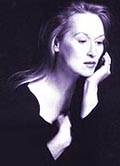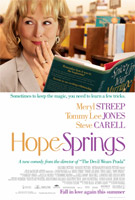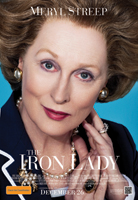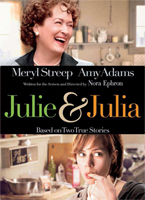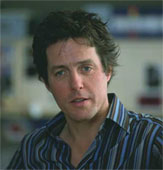Meryl Streep Florence Foster Jenkins
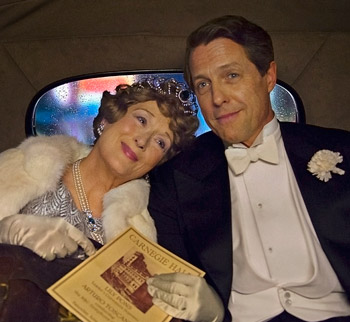
Meryl Streep Florence Foster Jenkins
Cast: Meryl Streep, Rebecca Ferguson, Hugh Grant, Simon Helberg, Neve Gachev
Director: Stephen Frears
Genre: Biography, Comedy
Rated: PG
Running Time: 110 minutes
Synopsis: In 1944, ageing heiress Florence Foster Jenkins is a highlight of the New York social scene. Generous patron of classical music in the city, and founder of the genteel Verdi Club, she and her English husband-cum-manager St. Clair Bayfield provide the city's elite with fabulous displays of tableaux vivants, starring, of course, Madame Florence herself.
Attending Carnegie Hall to hear the renowned soprano, Lily Pons, Florence is inspired to start singing again, deciding to take lessons – which the ever loyal Bayfield greatly encourages. Enter Cosme McMoon, a struggling young pianist to provide her accompaniment. It's his dream job!
Until he realises, of course, that despite considering herself a vocal phenomenon, Madame Florence can barely hold a tune. Still more confusing for McMoon, Florence and Bayfield have an unusual romantic arrangement – Bayfield is married to Florence, but lives with his girlfriend, Kathleen.
Florence decides to put on a private concert and Bayfield ensures – as he has done so often in the past – that the attendees are 'true music lovers:" friends of Florence who are enraptured by the joy she radiates when performing. The concert is a huge success. But when Florence decides to realise her dream of performing at Carnegie Hall, and gives a thousand tickets away to veterans returning from the war, Bayfield and McMoon have a potential crisis on their hands. Without being able to control the audience, can they protect the happy world they have created for Florence, a world of kindness and love where dreams can come true?
Florence Foster Jenkins
Release Date: May 5th, 2016
About The Production
Stephen Frears, Meryl Streep and Hugh Grant team up for the first time on Florence Foster Jenkins, an inspirational, poignant, heartwarming comedy about love, music and the pursuit of dreams.
It was the glorious chasm between Florence Foster Jenkins' self-belief and her startling failings as a singer that immediately hooked writer Nicholas Martin. 'I heard a song on YouTube," says the writer. 'I was struck by the sincerity of her voice and I found it very moving, very funny and very sad. I kept going back to listen to it and wanted to find out about her life. It was then I realised the story of her journey to performing at Carnegie Hall would make a compelling musical film."
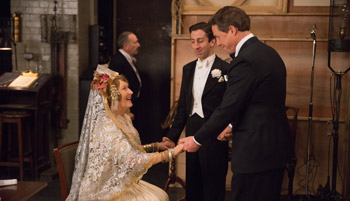 Researching into the life of Jenkins, Nicholas Martin was struck by Florence's astonishing force of personality – 'she was like the sun at the centre with all the planets in orbit around her" – and by her relationship with her 'husband," St. Clair Bayfield, whose diaries revealed his deep love for Florence despite living with another woman. With the accompanist Cosme McMoon, the trio became the centre of New York artistic society, first with her eccentric Tableaux Vivants, which always featured Florence as the central artistic muse, and later with her infamous musical recitals.
Researching into the life of Jenkins, Nicholas Martin was struck by Florence's astonishing force of personality – 'she was like the sun at the centre with all the planets in orbit around her" – and by her relationship with her 'husband," St. Clair Bayfield, whose diaries revealed his deep love for Florence despite living with another woman. With the accompanist Cosme McMoon, the trio became the centre of New York artistic society, first with her eccentric Tableaux Vivants, which always featured Florence as the central artistic muse, and later with her infamous musical recitals. 'Florence was a significant character in art and music in New York during the Second World War and she gave a lot of money to support the arts, including the provision of musical instruments to underprivileged children" explains Nicholas Martin. 'She also introduced a lot of very wealthy people to the world of music and persuaded them to contribute financially to the support of music in the city. She gave 1000 tickets to her Carnegie Hall concert to the war veterans and many of them had the time of their lives. They apparently nearly died laughing as the evening was so brilliant and bizarre! But did Florence herself know how she really sounded? That-s for the audience to decide."
Six months after beginning his research, Nicholas Martin had a screenplay. 'A friend told me producer Michael Kuhn knew a lot about music so we sent it to him. He liked it and Stephen soon followed. I said only one person can play Florence and that's Meryl Streep, otherwise we might just as well go home. I knew she loved music and I knew she loved iconic characters and I had a hunch she would go for it. When Michael Kuhn rang me and said, congratulations you've got your movie; I knew what he meant immediately. It was a miraculous moment in my life! We had to wait for her to be available but that gave us time to really work on the script and make it much much better."
The appeal of Martin-s screenplay was immediate for Michael Kuhn. 'When you read a script you're looking for something that's different and emotionally satisfying and I thought this was a mixture of funny and touching," explains the producer. 'I couldn't imagine anyone but Meryl Streep playing the part of Florence, so the next thing was to ask how would we get to Meryl Streep.
We had to get someone who she was likely to want to work with and Stephen Frears embodies that having worked with many of the grandes dames of cinema – Judi Dench, Helen Mirren and so on – and I thought if he said yes we would have a reasonable chance. The thing I most admire about Stephen Frears is that he never repeats himself, so every film he does is a new adventure. He's always pushing forward to do something different and that's very admirable. He said right away that he would do it if Meryl would do it. So we sent it to her agent and she came back quickly and said she wanted to do it. It's often the case with good material that the film comes together quickly."
'I read Nicholas Martin's script and thought, -this is good fun'," says Stephen Frears. 'It was witty, entertaining and interesting. It was a good story; it had good relationships and good jokes – what more do you want? There is a famous recording of her and I was told that back in the 60s people used to play it at dinner parties. I heard the real footage of her singing on YouTube and it was gobsmacking and I just started to laugh! The recording is so hilarious and dreadful, but also touching and so affecting."
The film came together extremely quickly. As Stephen Frears comments: 'Nicholas Martin must have been amazed as we all just turned up and said yes – me, the producers, Meryl Streep and Hugh Grant. It doesn't usually happen as easily as that. But his screenplay is grown up, it's mature. Nicholas Martin wrote with an eye to people having a good time so he was always conscious of entertaining people as he wrote it."
Similarly, as soon as Cameron McCracken read the script at Pathé, he agreed to come on board to finance and distribute the film. It marked his fifth collaboration with Stephen Frears and his producer Tracey Seaward; his third with Meryl Streep; and his second with Michael Kuhn. 'In many respects, the production felt like a family gathering, and when Christine Langan came on board with BBC Films, the family was complete."
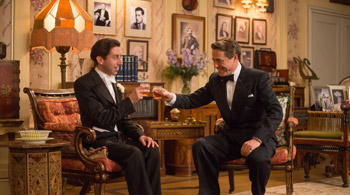 Stephen Frears found Florence an engrossing character: 'Florence was a rich woman, a socialite who did a lot for music during the war; she supported the renowned conductor Toscanini and was a philanthropist. She's always reminded me of Margaret Dumont, the actress (and comic foil) Groucho Marx used to chase after, just preposterous but touching at the same time. There were groups of people in New York who needed culture during the terrible times of the war and she kept people's spirits up by laying on these amateur evening. She sees Lily Pons, a French singer with an amazing voice, perform and she is inspired to take up singing again and have lessons – and then the true horror emerges!
Stephen Frears found Florence an engrossing character: 'Florence was a rich woman, a socialite who did a lot for music during the war; she supported the renowned conductor Toscanini and was a philanthropist. She's always reminded me of Margaret Dumont, the actress (and comic foil) Groucho Marx used to chase after, just preposterous but touching at the same time. There were groups of people in New York who needed culture during the terrible times of the war and she kept people's spirits up by laying on these amateur evening. She sees Lily Pons, a French singer with an amazing voice, perform and she is inspired to take up singing again and have lessons – and then the true horror emerges! Bayfield was an unsuccessful actor when they met and clicked. He found a way to live and she found a man who loved her and looked after her even though he may have been a philanderer – what more could she want? The central characters of Florence and Bayfield are ridiculous, touching and preposterous at the same time, but they work well together."
For her part, Meryl Streep was familiar with Florence Foster Jenkins, but it was the prospect of working with Stephen Frears that most appealed: 'I have a vague memory at my first year of drama school of people passing around a recording of Florence singing. I remember some sort of screech that we were all screaming about. Stephen called me and said -I have a part for you, it's the worst opera singer in the world' and I was thrilled. I said yes before I read the script because I've always wanted to work with Stephen Frears. He has a reputation among actors as someone you really want to work with."
The calamitous singing aside, for Meryl Streep the story had a very tender core: 'It's about a long and happy relationship between two people whose self-interest was equally served by the relationship as by their honest feeling and affection for each other. The story has so much real emotion to it."
'The real Florence Foster Jenkins was the ultimate club lady," continues Meryl Streep. 'Those were the days when the professions were not open to women, so there were women of means who to keep themselves busy did charitable good works. Florence was a great patron of the arts in New York and that's how she moved up through the social echelons of society. She kept the musical life of the city alive. She underwrote concerts at Carnegie Hall and spread around the money she had inherited from her husband and father."
More than just a philanthropist, however, Jenkins was also a woman determined to fulfill her true passion. 'Florence was a person who kept something we all have when we are children; when you can't really do anything that well, but you hurl yourself into the imagining of it and take delight in the doing," says Meryl Streep. 'It's the purist meaning of the word amateur. She only sang for her friends and hand-picked audiences – the only exception being the Carnegie Hall performance – because she couldn't sing that well but she loved it and loved music and there's something of that delight in our script."
Once Meryl Streep had committed, Stephen Frears then went to Hugh Grant. 'I told him I'd found something I thought he'd like, and he said yes within three days too," he says. 'I've always thought he was a very, very good actor and a brilliant comedian and I like people who can play light comedy."
The film marks the second collaboration between Hugh Grant and producer Michael Kuhn following their first over twenty years ago: 'I haven't worked with Hugh since I first met him on Four Weddings and a Funeral in 1994. You don't succeed as a star of light comedy for such a long time or on such a scale without some deep seated ability; you have to be good at drama and you have to be good at comedy. It was important that Bayfield be both touching and funny as that's the essence of this film. Hugh Grant is a master at that; he's really impressive."
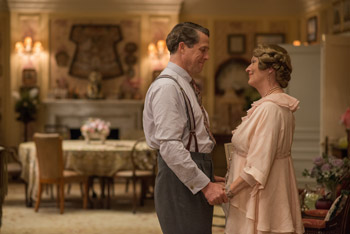 'I was vaguely aware of Florence Foster Jenkins," says Hugh Grant. 'I remember years ago my cousin sent me this tape of the worst singer in the world and thinking it was up there in the funniest things I'd ever heard. But I wasn't doing much acting because I was involved in the Hacked Off press transparency campaign. One of our supporters is Stephen Frears and he used to come to some of our events and would say -We should do a film together' and I-d tell him I wasn-t really acting any more. But he sent me Nicholas Martin's script which was truly brilliant, genuinely funny and real and touching. Meryl Streep was already cast as Florence so I had to do it."
'I was vaguely aware of Florence Foster Jenkins," says Hugh Grant. 'I remember years ago my cousin sent me this tape of the worst singer in the world and thinking it was up there in the funniest things I'd ever heard. But I wasn't doing much acting because I was involved in the Hacked Off press transparency campaign. One of our supporters is Stephen Frears and he used to come to some of our events and would say -We should do a film together' and I-d tell him I wasn-t really acting any more. But he sent me Nicholas Martin's script which was truly brilliant, genuinely funny and real and touching. Meryl Streep was already cast as Florence so I had to do it." Hugh Grant plays Foster Jenkins' 'husband" and manager. 'Bayfield is an impresario but he also has a wonderful sense of the absurd," says Stephen Frears. 'Florence and Bayfield live in a bubble and he was always very concerned to protect her and that the bubble shouldn't be pricked. I say she needed protecting but the truth is she played at Carnegie Hall and got away with it."
'I was genuinely fascinated by Bayfield," says Hugh Grant, 'and I quite liked being him, which is not always the case with characters I-ve played. In real life and in the film, Bayfield is the illegitimate grandson of an Earl, a bit of a failure. He roamed the world being a failed actor and ended up in New York pretty penniless. And then he met Florence, an heiress who sponsored the musical life of New York, and they hit it off."
'I think he played up his aristocratic roots more than he should have as well as his bohemian actor thing and she fell for all that," continues Hugh Grant. 'But he was charmed by her and they became a double act. Even though they never formally married, they lasted as a couple for 30-40 years. He's a man who is puffed up with false self-esteem based on Florence's position and wealth and renown, he's a man of straw, and I found that amusing. But it's very obvious who wears the trousers in the relationship; Florence needs him when she's performing, but ultimately she's the one with the money."
'He supports and protects her while she's performing in concerts, which are not just bad, but hilariously bad. The key was to edit her audiences so that it is only people who will love and approve of her. People from her own musical societies, and not the general public, are invited. That way, she never gets to know just how bad she is."
Working opposite Meryl Streep was, says Hugh Grant, 'bloody frightening! Not only is she a star, but she's also probably the greatest screen actor ever in the history of the world. So there is this aura around her. It's amazing to watch her, you feel like you are watching Leonardo da Vinci drawing; there is absolutely nothing she can't do and the thing that struck me most was that every single take she did was completely different from the one before. She never thinks, -Oh, I didn't quite get that I'll do it again better'; it's re-invented each time and I was particularly impressed by that."
'It was all frightening," laughs Hugh Grant. 'Working with Meryl Streep was obviously frightening and I was a little bit frightened of Stephen Frears too as he's got a bit of a reputation of making classy award-winning films, which is not really where I come from. I had to do a certain amount of serious acting in this and so it was all extremely intimidating for me. I ended up doing about a year's worth of prep as we had to wait quite a while for Meryl to be available. It was the most prepared I've been for a film!"
The third character in the unique ménage that makes up the film is Cosme McMoon, Florence's piano accompanist. Simon Helberg, best known for the American television series The Big Bang Theory was cast in the role.
'Early on, the film's composer Alexandre Desplat told me not to cast an actor who couldn't play piano at a high level," says Stephen Frears. 'My casting director in New York said: -You want Simon Helberg.' I met him and realised how funny and brilliant he is. He met Meryl Streep and she immediately adored him. You can sense the warmth and affection between them."
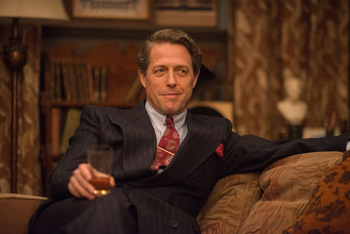 'It was a point of genius by the New York casting agent to think of Simon Helberg," concurs Michael Kuhn, 'as not only is he a really great comic actor, but also a really great pianist. We really lucked out with him because watching someone pretending to play the piano is really awful."
'It was a point of genius by the New York casting agent to think of Simon Helberg," concurs Michael Kuhn, 'as not only is he a really great comic actor, but also a really great pianist. We really lucked out with him because watching someone pretending to play the piano is really awful." Simon Helberg came to the film not knowing anything about the characters but the screenplay and the chance to work opposite Meryl Streep, Hugh Grant and with Stephen Frears sealed the deal for him: 'When I read the script I ran the gamut of emotions. I laughed hysterically, I cried, I found it incredibly profound. It's about a love of music but also a love of life and how our own perception of life wins out however much it may be off key. It reminded me of a line in Being There: -Life is a state of mind.' There's a purity to Florence, there's no cynicism, it's all for the music, she's a dreamer. And Meryl Streep is one of the most charming people ever to exist so that combination is pretty irresistible."
Meryl Streep repays the compliment: 'I didn't know much about him when we first met but we hit it off right away. He's so funny and smart. The movie comes alive when Simon Helberg is on screen as his character is seeing the movie from the audience point of view. We're very lucky to have Simon Helberg as he's a brilliant comic, but he can also play these very difficult piano pieces.
Stephen Frears was right; we couldn't have done it without an actor who wasn't an accomplished pianist. He had the hardest job of all as he has to play difficult pieces as well as react to what's going on in the room. He's just brilliant. He's so alive and the playing is impeccable; he never made a mistake which is astonishing."
Hugh Grant adds: 'Simon Helberg was a genius piece of casting. He was perfect for the role and on top of that he's a concert standard pianist! I hope people appreciate those are his hands playing the piano."
Simon Helberg was enchanted by the eccentricity of all the characters in the film, particularly McMoon: 'They are these odd little flowers who bloom when Florence comes into their lives. She brings out all the best qualities in them. McMoon is a fish out of water and has no clue what he's entering into at all. He's fresh off the bus. He's a good piano player but perhaps not concert level. He finds out immediately he's entered the Twilight Zone and has no idea what is going on. He shares a love of music with Florence and there is no judgment in him, they both have an innocence. It's fun to watch him wriggle around and try and get out of performing at the concert...he's sweating a lot and that comes naturally to me."
When it came to preparing for the shoot, Meryl Streep was required to master the art of singing badly. Meryl Streep trained as a singer and, as Stephen Frears points out, 'to be able to sing badly you first have to be able to sing well."
For the actress, it was a challenge she relished taking on. 'I thought it would be a piece of cake as I can't really sing that well, but it was much more difficult," says Meryl Streep. 'First of all, Florence tackled the most difficult arias in the canon of operatic diva performances. She does -The Queen of the Night' aria from Mozart's -The Magic Flute' and the -Indian Bell Song' from -Lakme' by Delibes. What makes it amusing is how close she comes – her voice approaches adequate – so it's just when it goes wildly off that it gets hilarious. What interested me was that she was almost there and in her mind's eye she was achieving it and that's what kept her going."
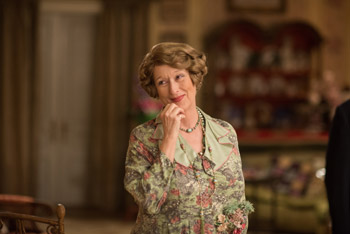 Michael Kuhn saw this as the key to Meryl Streep-s brilliance at capturing the character's essence: 'Meryl Streep said it wasn't about how appalling a singer Florence was, it was about how close to being a good singer she became. That was very interesting and I think that's true. If she was so bad you couldn't bear to listen and she wouldn't have had any success, so it's the nearly getting it right that is the tease and that's what Meryl Streep has really cracked. That is far more interesting than just being bad."
Michael Kuhn saw this as the key to Meryl Streep-s brilliance at capturing the character's essence: 'Meryl Streep said it wasn't about how appalling a singer Florence was, it was about how close to being a good singer she became. That was very interesting and I think that's true. If she was so bad you couldn't bear to listen and she wouldn't have had any success, so it's the nearly getting it right that is the tease and that's what Meryl Streep has really cracked. That is far more interesting than just being bad." Meryl Streep trained with vocal coach Arthur Levy, beginning with singing the pieces as well as she could. 'Then we went off into the landscape of mistakes," she says. 'I didn't think how Florence Foster Jenkins would have sang the arias I thought about how my Florence would have approached them. I remember hearing Irving Berlin playing his music and he was singing along and he was wildly off pitch! That made me think that maybe there's that disconnect even in very accomplished musicians."
For Meryl Streep it was the poignancy of Jenkins' desire that struck a chord: 'What's heartbreaking – and heartbreakingly funny – is the aspiration. You can hear her take a breath, just a little bit too late to hit the note, but you can hear the aspiration, the desire, the love of music and how close she comes – that's what's so great."
The astonishing thing was how close Meryl Streep came to sounding like the real Florence. 'The first extraordinary moment was when Meryl Streep began working on her singing voice to find the character of Florence through the music. It was vital that we get a sense of the real Florence through the voice. One afternoon she sent a sound clip of her singing as Florence. I couldn't believe how she'd captured the tragedy and hilarity of Florence and I thought, -that's it we're fine, this is going to be great,'" says Nicholas Martin.
'Despite a lifetime of lessons, Florence still had dreadful technique and does what all awful singers do which is force their voice," says Nicholas Martin. 'She had this sub-glottal air pressure – which we describe as -defying medical science' in the film – where her chords didn't phonate freely and were tense the whole time. Occasionally she would hit a good high note, so there was this mixture of quite nice singing mixed with absolutely dreadful stuff. She would sing in Russian, German, French and Italian even though she couldn't pronounce any of the words. She would bludgeon her way through with total confidence and absolute sincerity."
Hugh Grant, for one, was confident Meryl Streep could pull it off with panache. 'I knew Meryl Streep would be brilliant as she's never been anything less than brilliant, but it did occur to me how difficult it would be to reproduce bad singing that isn't just bad singing but funny bad singing, as it would be easy to ham it up and go for laughs," he says. 'What makes the real Florence funny is that she really meant every word of it. The first time I heard Meryl do it was at the read through and it was sheer genius; she was giving it her all, believing in it, loving it but being unspeakably terrible."
For Simon Helberg in the role of piano accompanist Cosme McMoon, the performance scenes proved a complex juggling game of acting and playing the piano. 'Florence doesn't have a sense of rhythm or pitch so Meryl would intentionally stumble all over the place and I would have to follow her; it was a little like tandem rock climbing, a sort of mirroring exercise. Her job was insanely hard, to be almost right but just off enough that it makes you cringe."
The process of achieving this delicate balancing act was made easier because Stephen Frears was at the helm.
'Stephen Frears gives you great latitude in terms of performance," says Meryl Streep. 'But if he wasn't happy he would ask you to do it again, he just wouldn't tell you how to do it. He has the confidence of all the great directors that I've worked with, that there's no worry about whether they've made the right decision, they know it when they see it. That confidence gives actors the confidence to feel OK to give their all and expose themselves emotionally because you trust that he's there and he's got a really good eye. I really loved working with him."
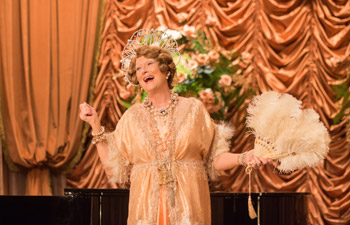 Stephen Frears' deceptively laid-back attitude also struck home with the cast. 'Stephen Frears is extraordinarily unopinionated for a director, which is rather nice," says Hugh Grant. 'He doesn't want to talk about back story or motivation; he just lets you get on with it."
Stephen Frears' deceptively laid-back attitude also struck home with the cast. 'Stephen Frears is extraordinarily unopinionated for a director, which is rather nice," says Hugh Grant. 'He doesn't want to talk about back story or motivation; he just lets you get on with it." For Simon Helberg, it was Stephen Frears -s pace of work that impressed. 'Stephen works incredibly fast so it's almost as though the film is a living being!" he says. 'It's scary at first but it keeps it fun and alive. Stephen Frears is totally collaborative but totally visionary; he's not confused about what he should do, but sometimes he'll ask what you think of the scene and it makes for a special atmosphere as everyone is trying to make the best film they can. He really understands about being a conductor; there's no constant tinkering, it's a well-oiled machine. He's self-deprecating; it's the balance of being serious about what you do, but not taking it too seriously."
Filming took place in the UK, with Liverpool standing in for New York. The two main concert set-pieces were both filmed in London – Carnegie Hall at Hammersmith Apollo and the Ritz Carlton at the Park Lane Hotel. As Frears explains, 'you couldn't make it in New York now as it doesn't look like the 1940s anymore."
For production designer Alan Macdonald, the film was a creative pleasure. '1940s New York is like Christmas and birthdays come at once for a designer!"
Macdonald took inspiration for his designs from the eccentric interiors of Florence Foster Jenkins' own apartment in New York. 'She was totally eclectic in her taste, ranging from priceless antiques to bric a brac," he explains. 'She was notoriously compulsive in her acquisition of furniture and paintings so that made me realise that the rooms had to be loaded with information. We chose a lot of the props in a totally random way to mirror her eccentricity and absurdity so the overall look is amusing and compelling. Meryl Streep visited the set just before we began shooting and had a few comments, which all made perfect sense. I pushed it a bit further and put in a few more eccentric pieces and photographs of composers and opera singers."
Alan Macdonald recreated the famed interiors of New York's Carnegie Hall in London's Hammersmith Apollo. 'We had to completely obscure what was there as it had to be an accurate representation of Carnegie Hall."
Alan Macdonald also had to recreate The Commodore Hotel where Florence's tableaux vivants were put on. 'The first one we see was set in the Deep South with the Angel of Inspiration descending with Florence Foster Jenkins being lowered from the rafters wearing a pair of wings, which had a certain sophistication mixed with a quality of amateur dramatics – quite absurd," says Alan Macdonald.
For Florence's performances in public at the Ritz Carlton, Alan Macdonald opted for the stunning art deco ballroom of London's Park Lane Hotel. 'We added a tacky jewellery box effect for when the curtains opened, in contrast to the beautiful room around it," says Alan Macdonald. 'We were able to film there just before they started renovations and so we were more or less able to do what we wanted."
For the New York exteriors, the team used locations in Liverpool. 'Everything at street level in New York is so completely different now that it's almost impossible to recreate 1940s New York," says Alan Macdonald. 'Interestingly, all the ocean liners set off from Liverpool for New York so there was a cross pollination of architectural ideas."
Consolata Boyle was brought on as costume designer. 'Consolata is brilliant," says Frears. 'I barely speak to her as you just know that what she's doing is dazzling. I've worked with her for 25 years and I'm very lucky."
'I was fascinated and enthralled by the character of Florence," says Consolata Boyle. 'The film is about something I find really important – a love story between three people who love each other in particular ways, but also about the transformative effect of music. The simplicity of that thought was what I held onto and everything followed on from that."
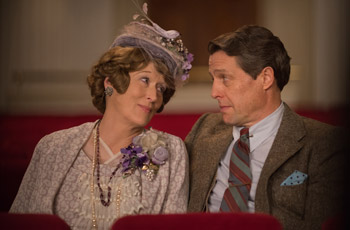 Consolata Boyle approached the period through the characters. 'It's like starting from scratch even if you've worked in the period before," she explains. 'Florence's extraordinary eccentricities and her coterie were a very particular thing; she lived and thrived in a very sealed off world. She dressed the same as when she was a girl before the various tragedies and darkness affected her life, so she kept the element of the child and the dressing up box in her clothes. Everything around her was in rather childish colours; it was a very protected world."
Consolata Boyle approached the period through the characters. 'It's like starting from scratch even if you've worked in the period before," she explains. 'Florence's extraordinary eccentricities and her coterie were a very particular thing; she lived and thrived in a very sealed off world. She dressed the same as when she was a girl before the various tragedies and darkness affected her life, so she kept the element of the child and the dressing up box in her clothes. Everything around her was in rather childish colours; it was a very protected world." 'She was a supreme performer so her performing clothes were gorgeously outrageous and she carried the flamboyance of her performance into her everyday clothes. Her costumes were high camp but with a softness so that she drew people in no matter how outrageous she looked. She had no sense of embarrassment about how she looked so people did not question it."
Cosolata Boyle had made several padded bodies for Streep to make her appear heavier and closer to the real Florence Foster Jenkins. 'We had a lot of discussion early on about how we would express her inner emotions in her clothing. I worked incredibly closely with Meryl every step of the way. I also worked closely with Alan Macdonald so every costume worked in the physical environment."
Cosolata Boyle-s efforts certainly paid off. 'Florence loved bizarre costumes and there seemed to be no end to her creativity," says Martin. 'I saw Meryl Streep dressed as Florence for the first time in an enormous amount of jewellery, a tiara and shimmering robes and she just looked magnificent and extraordinary and I couldn't quite believe it was happening as a result of something I wrote!"
Michael Kuhn 'Stephen Frears has a dictum that you just hire the best people and keep out of the way and I adhere to that. We have one of the best costume designers in the world, Consolata Boyle and production designer Alan Macdonald and his team, and a great cameraman in Danny Cohen. You just try to keep out of their way and let them get on with it."
Another key member of the behind the scenes team is composer Alexandre Desplat. Florence Foster Jenkins marks Alexandre Desplat's fourth collaboration with Stephen Frears.
This was a subject Alexandre Desplat could not resist. 'For a composer the subject of how well or badly you sing is very exciting," he says. 'I knew the balance between emotion and drama would be special."
Alexandre Desplat had to create a score that would complement and work with the original music in the film, a challenge he took on board with gusto. 'There's a lot of existing music in the film and it's a matter of cutting through that so the score doesn't interfere. I often try purposefully not to write a score that is faithful to the music of the film's era but with this film the music was very important to the story. It gave me an opportunity to find another angle that would not interfere with the classical recordings of Florence Foster Jenkins, so I created a scored with a mix of jazz of the 1940s with orchestral texture on top that could play around the existing music. I wanted to reflect the love story between Bayfield and Florence, Florence's love of life and music and the comedy and it took a while to find these three elements.'
Alexandrew Desplat found a willing and talented collaborator in Meryl Streep. 'We know Meryl can sing but nobody knows she can sing like an opera singer," he says. 'She's a fantastic singer with a huge range and she understands music and has a great feeling for it. And what is striking is that she can sing very, very well, but she can also sing a bit out of tune, which is very difficult. To pretend to sing badly you have to be a very strong musician. She's very precise and has done a remarkable job here."
The film's musical set pieces were recorded live. 'Music is very inflexible," says Stephen Frears on the challenges that this presented. 'You can change dialogue. You can't change music as it has certain patterns and rhythms so you're always trying to work out the length of sequences."
Simon Helberg adds: 'We recorded the album at Abbey Road and then they threw it in the trash. It was more of a back-up and great practice and eased the tension when we recorded live as there was an illusion of a back-up. Everything was recorded live, it was very complex and quite a process, but it's important to catch the energy."
With filming complete, the team has high hopes for Florence Foster Jenkins. 'It was heaven watching the film with an audience for the first time," says Stephen Frears. 'They laughed at more things than I expected them to. I think all the actors are wonderful and I was lucky to make this film with this cast and crew."
Michael Kuhn agrees: 'I think a story about an eccentric is not enough to make a good film. You need something more. Florence's famous deathbed saying, -People may say I couldn't sing, but no one can say I didn't sing,' is a very profound thought. If you love something, you should do it, even if you're not very good at it. The film is also about kindness and about how a man who was down on his luck was given a life by this eccentric woman and in return she found someone to make her dreams come true. And all of us respond to someone who is 'technicolor" when they come into our life as they light up our world."
Florence Foster Jenkins
Florence Foster Jenkins was born in Pennsylvania in 1868. A piano prodigy as a child, her musical ambitions as an adult were thwarted by her wealthy father's refusal to fund her studying abroad. She left home and, after a career as a piano teacher, settled finally in New York in 1900 when she decided to become a singer. In 1909, two events happened that would help her fulfil her dream: her father died, leaving her a considerable inheritance; and she met St. Clair Bayfield, an illegitimate son of an English earl and failed actor.
Florence took singing lessons and threw herself head first into the musical social circles in New York. She founded her own club, The Verdi Club, as well as joining several literary and historical clubs in the city where, as director of music, she produced and starred in popular tableaux vivants for select private audiences. Soon she was giving recitals of arias by Verdi, Mozart and Johann Strauss as well as lieder by Brahms, all accompanied by her pianist Cosme McMoon. Despite, or perhaps because of, her lack of singing talent, she attracted an enthusiastic following and her fame spread beyond the high society salons of the city. Her triumph was her performance at New York's Carnegie Hall on 25 October, 1944. It sold out in just two hours and the ecstatic audience included such celebrities as song writer Cole Porter, composer Gian Carlo Menotti, and soprano Lily Pons. Florence died a few months later at the age of 76.
Florence Foster Jenkins
Release Date: May 5th, 2016
Have You Seen This?
MORE
- Mission: Impossible Fallout
- Glenn Close The Wife
- Allison Chhorn Stanley's Mouth Interview
- Benicio Del Toro Sicario: Day of the Soldado
- Dame Judi Dench Tea With The Dames
- Sandra Bullock Ocean's 8
- Chris Pratt Jurassic World: Fallen Kingdom
- Claudia Sangiorgi Dalimore and Michelle Grace...
- Rachel McAdams Disobedience Interview
- Sebastián Lelio and Alessandro Nivola...
- Perri Cummings Trench Interview

